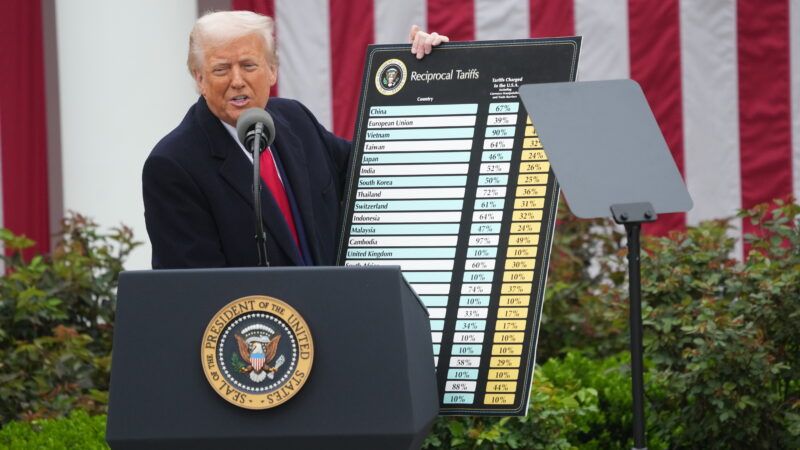Top Stories
Supreme Court Weighs Trump’s Tariffs Amid Economic Critique

URGENT UPDATE: The U.S. Supreme Court is currently evaluating the legality of President Donald Trump’s controversial tariffs as new evidence from 45 American economists challenges his claims of a national emergency. This pivotal case could reshape the future of U.S. trade policy, with far-reaching implications for the economy.
New reports confirm that Trump’s April announcement of hefty tariffs on imports from numerous countries was justified by what he described as an “unusual and extraordinary threat” to national security. However, a Supreme Court brief signed by leading economists argues that this assessment is fundamentally flawed. The economists assert that the longstanding trade deficits are not an emergency but rather commonplace, calling into question Trump’s authority under the International Emergency Economic Powers Act (IEEPA).
The Supreme Court is considering whether IEEPA grants the president any authority to impose tariffs, which have never before been applied under this law. This is critical as three lower courts have already rejected Trump’s assertion that he can unilaterally rewrite the tariff schedule established by Congress.
The economists’ brief states that the persistent gap between U.S. exports and imports, which Trump cites as a threat, has been consistent for over fifty years. They argue that trade deficits are not inherently problematic, and in fact, they correspond with a “foreign investment surplus,” indicating economic strength rather than weakness.
Moreover, the brief highlights that Trump’s tariffs have not effectively addressed the trade deficit. Data indicates that the U.S. trade deficit in goods actually increased between January and June 2025, despite the implementation of these tariffs. The economists warn that while tariffs reduce total trade flows, they do so in both directions, meaning the overall trade deficit may remain unchanged.
As the Supreme Court deliberates, the implications of this case extend far beyond legal technicalities. Trump’s tariffs are projected to impact the U.S. economy by trillions of dollars over the next decade, affecting consumers and businesses alike. The “major questions” doctrine requires clear congressional authorization for decisions with significant economic consequences, and if Trump’s tariffs do not meet this threshold, it raises questions about the legitimacy of executive power in economic policy.
The urgency of this case is palpable as the justices weigh the potential fallout of Trump’s tariff strategy. With the American economy at stake, the outcome could redefine the relationship between the executive branch and Congress regarding trade issues.
Stay tuned for more updates as this developing story unfolds. The Supreme Court’s ruling could change the landscape of U.S. trade policy and set a precedent for future presidential powers. Keep following for the latest developments.
-

 World3 weeks ago
World3 weeks agoGlobal Air Forces Ranked by Annual Defense Budgets in 2025
-

 World3 weeks ago
World3 weeks agoMass Production of F-35 Fighter Jet Drives Down Costs
-

 Science3 weeks ago
Science3 weeks agoTime Crystals Revolutionize Quantum Computing Potential
-

 Top Stories3 weeks ago
Top Stories3 weeks agoNew ‘Star Trek: Voyager’ Game Demo Released, Players Test Limits
-

 World3 weeks ago
World3 weeks agoElectrification Challenges Demand Advanced Multiphysics Modeling
-

 Top Stories3 weeks ago
Top Stories3 weeks agoDirecTV to Launch AI-Driven Ads with User Likenesses in 2026
-

 Entertainment3 weeks ago
Entertainment3 weeks agoFreeport Art Gallery Transforms Waste into Creative Masterpieces
-

 Lifestyle3 weeks ago
Lifestyle3 weeks agoDiscover Reese Witherspoon’s Chic Dining Room Style for Under $25
-

 Health3 weeks ago
Health3 weeks agoGavin Newsom Critiques Trump’s Health and National Guard Plans
-

 Lifestyle3 weeks ago
Lifestyle3 weeks agoLia Thomas Honored with ‘Voice of Inspiration’ Award at Dodgers Event
-

 Entertainment3 weeks ago
Entertainment3 weeks agoFast & Furious Coaster Hits the Track at Universal Studios
-

 Politics7 days ago
Politics7 days agoLanguage Evolution: New Words Spark Confusion in Communication









